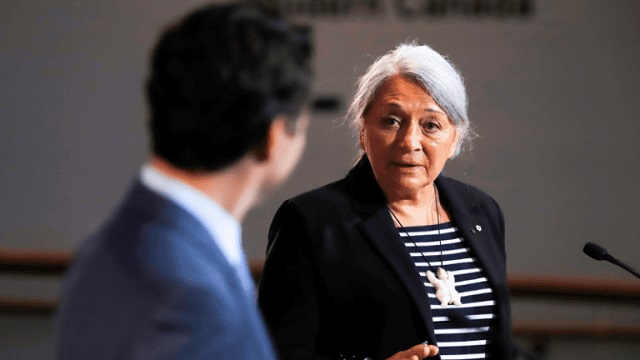MacDonald Laurier Institute
Bureaucrats should not be arbiters of our online world

From the Macdonald Laurier Institute
By Leonid Sirota and Mark Mancini
When it comes to regulating the internet, Ottawa tells Canadians to simply “trust the experts.”
The federal government has pursued a far-reaching internet regulation agenda. This includes the Online Streaming Act (previously known as Bill C-11) and the Online News Act (previously known as Bill C-18). Both are ostensibly designed to force foreign online platforms – streaming ones such as Netflix, Disney+, and YouTube in the former case, Google and Facebook in the latter – to provide support, mainly but not exclusively financial, to Canadian cultural and journalistic producers. The most recent addition to this regulatory programme, Bill C-63, partly targets online platforms too, but its reach is broader. It seeks to prevent a range of “online harms” – from the distribution of child pornography to hate speech.
These legislative endeavours have attracted commentary from all corners, not least from Macdonald-Laurier Institute experts. Much of the discussion has been critical of the government’s policies on the ground of their unwisdom, immorality, and possible unconstitutionality.
But we would like to take a different tack here and focus not on the ends pursued but the means employed by C-11, C-18, and C-63: the empowerment of administrative agencies as rule-makers and arbiters of Canadians’ online world. While they purport to regulate new technologies, business models, and cultural forms, these policies are a throwback to an old philosophy of government that subverts fundamental constitutional principles: democracy, the separation of powers, and the rule of law.
It is worth beginning with a brief restatement of what these principles mean. Democracy means the exercise of political power – law-making, in particular – by either the people themselves or, more commonly, through elected representatives. The separation of powers means that the making and execution of laws are different functions, not to be confused or conflated, and that adjudication of disputes in accordance with the law is a separate function still. The rule of law is a complex idea, but perhaps the pithiest formulation of its core meaning belongs to economist and political philosopher F.A. Hayek: it “means that government in all its actions is bound by rules … which make it possible to foresee how the authority will use its coercive powers in given circumstances.”
Contrast this with the philosophy underpinning the government’s approach to internet regulation. This philosophy permeated the report of a panel commissioned by the federal government at the end of the last decade to propose reforms to Canada’s regulation of the internet. Published in January 2020, “Canada’s Communications Future: Time to Act” called for legislation that would “provide sufficient guidance to assist the [Canadian Radio-Telecommunications Commission (CRTC)] in the discharge of its duties, but sufficient flexibility for it to operate independently in deciding how to implement sector policy. To achieve this, legislative statements of policy should set out broadly framed objectives and should not be overly prescriptive.” Translation: the democratically elected Parliament should not bother with making actual rules; that would be the job of the bureaucrats at the CRTC. They know better – both what the rules should be and how to apply them. Parliament is their enabler, not their master, and the courts should defer to their judgments.
In fairness, the legislation ultimately enacted or considered by Parliament does not go quite as far in empowering the CRTC or a new Digital Safety Commission (DSC) at the expense of Parliament as that report had urged. But it does go far. Probably the most important example of this concerns the amenability of user content – the average TikTok video, rather than Netflix – to CRTC regulation. This was one of the major points of contention when Bill C-11 was before Parliament. The Bill itself – despite claims by the government to the contrary – quite clearly permitted the CRTC to regulate user content, though it did not require it to do so. Amendments to remove this discretionary power were roundly rejected at the government’s insistence, in favour of leaving the user content question open for decision by the CRTC – only for the government to issue a Policy Direction to the CRTC “not to impose regulatory requirements” on user content.
The real scope of the law, and hence the degree of its impact on the freedom of expression of ordinary Canadians, will thus be fleshed out through the interplay of policy directions from Cabinet and CRTC consultations and orders. The same goes for various other aspects of the Online Streaming Act, such as Canadian content and discoverability requirements to be imposed on online platforms. The Online News Act, had it functioned as intended, would similarly have given the CRTC the final say over the extent of the obligations of the platforms subject to it. (In reality, one of these two platforms instead banned the publication of news content, and to avoid the other doing the same thing, the government made a deal with it that eviscerated the act.) And under Bill C-63, the decisions as to whether an online platform’s policies are “adequate to mitigate the risk that users … will be exposed to harmful content” is similarly within the remit of the DSC, with little if any guidance from Parliament as to what is in fact required.
This way of doing things undermines parliamentary democracy as anyone, except some scholars of administrative law would understand it. The people elected to make laws do not, in fact, make them in any meaningful way. On the contrary, they pawn off responsibility for contentious policy choices to administrators; they enact no more than empty shells, politely described as “framework legislation,” full of blanks to be filled out later. This transgression against constitutional principle is compounded when Cabinet makes a mockery of the parliamentary process with its policy flip-flops, which can then be reversed by further Cabinet fiat. The excuse typically given for this dereliction of duty is that the problems to be addressed are too complex for parliamentarians to deal with, which only makes one wonder at their nerve to have put themselves forward to do a job they are concededly unqualified for in the first place.
Enthusiasts for the internet agenda may say that it remedies its democratic deficiencies by consulting with those subject to new registration requirements. Yet CRTC consultations on the Online Streaming Act provided no more than a shabby ersatz of what democracy is supposed to mean – debate and discussion in Parliament. The submission period was short, and “industry-focused.” The CRTC ended up issuing orders requiring registration on a range of internet services that meet a $10 million revenue threshold, and the government issued a policy direction to the CRTC instructing that user content not be regulated. The CRTC’s regulatory plan for the Online Streaming Act is still being developed, and will likely involve further decisions about the reach of registration requirements. Whether the DSC does any better – if and when it implements Bill C-63 – remains to be seen. But, in any case, consultations that only include industry players, or some nominal number of users, cannot replicate an engaged and informed Parliament that weighs competing interests. Nor can it replace an engaged and informed citizenry, holding politicians to account for their choices at the ballot box.
Separation of powers fares no better. Instead of Parliament making laws, independent prosecutors bringing charges, and independent courts ruling on them, the CRTC and DSC combine their broad rule-making powers with the ability to both jawbone and outright prosecute online platforms, and to rule on the charges. The Canadian Civil Liberties Association rightly laments “the vast authority bestowed upon” the DSC “to interpret the law, make up new rules, enforce them, and then serve as judge, jury, and executioner.”
Here again, proponents of administrative power think they have an answer. Instead of the old-fashioned institutions wielding divided powers, they say the modern world requires the government’s full authority to be concentrated in the hands of experts. Agencies like the CRTC and, presumably, the DSC have the skills and wisdom to deal with the complex and increasingly difficult online environment. This claim is attractive in part because the layman often cannot comprehend the size and scale of challenges that modern regulation confronts, while politicians are all too often happy to demonstrate their unseriousness and ignorance.
But, in addition to its other problems, the vision of expert administrators who know better is simply unwarranted by the facts. For example, Konrad von Finckenstein, former chair of the CRTC, has told a Senate committee studying Bill C-11 that the CRTC simply does not normally deal with matters of this nature; and that the CRTC will likely need to hire contractors to fulfil its mandate under the legislation. The CRTC is also, by its own admission, not really up to speed when it comes to the universe of online media it is required to regulate under the Online Streaming Act: it has invoked the need to gather information about podcasting to justify its far-reaching registration requirements for platforms that host them. As for the DSC, it will of course be an entirely new bureaucratic structure with no existing expertise at all. Perhaps the government will appoint experts to it. But it doesn’t have to. Bill C-63 imposes no requirements as to the qualifications of the DSC’s members other than their being Canadian citizens or permanent residents. Under the Canadian Radio-television and Telecommunications Commission Act, the same is also true of the CRTC.
Over-reliance on administrative regulation and enforcement undermines the rule of law too, by making the rules applicable to the internet uncertain and their application unpredictable. The legislation relies on vague terms that will only be fleshed out as the agencies that apply it go along, which will discourage innovation, chill expression, and incentivize platforms to take quick action against their users to avoid getting into trouble with the regulators. And if the victims of unfavourable rulings want to challenge them in actual courts, the Supreme Court’s precedents prevent judges from coming to their own independent assessment of what the law requires, but instead require them to yield to the bureaucrats’ interpretations unless these are not “merely” mistaken, but outright unreasonable. Even the requirements of the Canadian Charter of Rights and Freedoms are dissolved in this bureaucratic acid; from the supreme law of Canada, they are diluted into values that must, to be sure, be taken into account, but only as a factor among others.
All this may seem like legalistic pedantry propounded by academics who do not care about the pressing needs of contemporary society. But that impression would be mistaken. It is precisely the government’s disregard for Canada’s constitutional foundations that ultimately ensures that the rules produced for it by its administrative instrumentalities are out of touch.
Instead of legislation reflecting Canada’s public opinion as represented in Parliament, we are to be governed by rules drafted by unrepresentative bureaucrats, potentially influenced by special interest groups with a privileged access to them. Instead of the exercise of coercive power being channelled through institutions with limited remits keeping one another accountable, we are told to trust experts who cheerfully admit having no real expertise to speak of. And instead of the law being predictably and impartially applied by judges who are not invested in the government’s policy and do not depend on government goodwill for reappointment, the law, and the constitution itself, only count insofar as they are consistent with administrative need.
It may be that we are stuck with the administrative state. Although some scholars have made arguments to the contrary, we believe that, as a matter of law, Parliament is entitled to delegate very considerable policy-making powers to agencies such as the CRTC and the DSC. If the government is set on pursuing its regulatory agenda through the old-fashioned means of creating and empowering bureaucratic structures, the courts will not save us, even though, as we have argued elsewhere, they have become rather more skeptical of the administrative state’s claim to be the solution to all the problems of the modern world than they used to be until fairly recently.
But the government having the authority to do something does not mean that doing it would be a good idea. It, and we the citizens, should embrace the judiciary’s skepticism of the vision of government-by-administrator that characterizes the federal government’s plans. More to the point, we should recall what our most important constitutional principles mean. If we are not to erode them, we need to reject the means the government is proposing to employ, as well as, arguably, the ends it is pursuing.
Leonid Sirota is Senior Fellow with the Macdonald-Laurier Institute, and an Associate Professor in the School of Law at the University of Reading, in the United Kingdom, where he teaches public law. His research interests include the rule of law, constitutional interpretation, administrative law, the freedoms of conscience and expression, election law, and other aspects of Canadian and comparative public law.
Mark Mancini, a Senior Fellow with the Macdonald-Laurier Institute, is a Ph.D. candidate at the University of British Columbia, Peter A. Allard School of Law. He holds a J.D. from the University of New Brunswick, Faculty of Law, and an LL.M. from the University of Chicago Law School.
Business
Proposed changes to Canada’s Competition Act could kneecap our already faltering economy

From the Macdonald Laurier Institute
Aaron Wudrick, for Inside Policy
No party wants to be seen as soft on “big business” but that is a bad reason to pass potentially harmful, counterproductive competition policy legislation.
The recent federal budget was widely panned – in particular by the entrepreneurial class – for its proposal to raise the capital gains inclusion rate. As it turns out, “soak the rich” might sound like clever politics (it’s not) but it’s definitely a poor narrative if your goal is to incentivize and encourage risk-taking and investment.
But while this damaging measure in the federal budget has at least drawn plenty of public ire, other harmful legislative changes are afoot that are getting virtually no attention at all. They’re contained in Bill C-59 – the omnibus bill still wending its way through Parliament to enact measures contained in last fall’s economic statement – and consist of major proposed amendments to Canada’s Competition Act. The lack of coverage and debate on these changes is all the more concerning given that, if enacted, they could have a long-term negative impact on our economy comparable to the capital gains inclusion rate hike.
Worst of all, the most potentially damaging changes weren’t even in the original bill, but were brought forward by the NDP at the House of Commons Standing Committee on Finance, and are lifted directly from a previous submission made to the committee by the Commissioner of Competition himself. In effect, they would change competition law to put a new onus on businesses to prove a negative: that having a large market share isn’t harmful to consumers.
MPs on the committee have acknowledged they don’t really understand the changes – they involve a “concentration index” described as “the sum of the squares of the market shares of the suppliers or customers” – but the government itself previously cast doubt on the need for this additional change. It’s obvious that a lot of politics are at play here: no party wants to be seen as soft on “big business.” But this is about much more than “big business.” It’s about whether we want to enshrine in law unfounded, and potentially very harmful, assumptions about how competition operates in the real world.
The changes in question are what are known in legal circles as “structural presumptions” – which, as the name implies, involve creating presumptions in law based on market “structure” – in this case, regarding the concentration level of a given market. Presumptions in law matter, because they determine which side in a competition dispute – the regulatory authority, or the impugned would-be merging parties – bears the burden of proof.
So why is this a bad idea? There are at least three reasons.
First of all, the very premise is faulty: most economists consider concentration measures alone (as opposed to market power) to be a poor proxy for the level of competition that prevails in a given market. In fact, competition for customers often increases concentration.
This may strike most people as counterintuitive. But because robust competition often leads to one company in particular offering lower prices, higher quality, or more innovative products, those who break from the pack tend to attract more customers and increase their market share. In this respect, higher concentration can actually signal more, rather than less, competition.
Second, structural presumptions for mergers are not codified in the US or any other developed country other than Germany (and even then, at a 40 percent combined share rather than 30 percent). In other words, at a time when Canada’s economy is suffering from the significant dual risks of stalled productivity growth and net foreign investment flight, the amendments proposed by the NDP would introduce one of the most onerous competition laws in the world.
There is a crucial distinction between parliamentarians putting such wording into legislation – which bind the courts – and regulatory agencies putting them in enforcement guidelines, which leave courts with a degree of discretion.
Incorporating structural presumptions into legislation surpasses what most advanced economies do and could lead to false negatives (blocking mergers that would, if permitted, actually benefit consumers), chill innovation (as companies seeking to up their game in the hopes of selling or merging are deterred from even bothering), and result in more orphaned Canadian businesses (as companies elect not to acquire Canadian operations on global transactions).
Finally, the impact on merger review will not be a simplification but will likely just fetter the discretion and judgment of the expert and impartial Competition Tribunal in determining which mergers are truly harmful for consumers and give more power to the Competition Bureau, the head of which is appointed by the federal Cabinet. Although the Competition Bureau is considered an independent law enforcement agency, it must still make its case before a court (the Tribunal, in this case).The battleground at the Tribunal will shift from focusing on the likely effect of the merger on consumers to instead entertaining arguments between the Bureau’s and companies’ opposing arguments about defining the relevant market and shares.
Even if, after further study, the government decided that rebuttable structural presumptions are desirable, C-59 already repeals subsection 92(2) of the Competition Act, which allows the Tribunal to develop the relevance of market shares through case law – a far better process than a blanket rule in legislation. Nothing prevents the Bureau from incorporating structural presumptions as an enforcement screen for mergers in its guidelines, which is what the United States has done for decades, rather than putting strict (and therefore inflexible) metrics into statute and regulations.
No one disputes that Canada needs a healthy dose of competition in a wide range of sectors. But codifying dubious rules around mergers risks doing more harm than good. In asking for structural presumptions to be codified, the Competition Bureau is missing the mark. Most proposed mergers that will get caught by these changes should in fact be permitted on the basis that consumers would be better off – and the uncertainty of being an extreme outlier on the global stage in terms of competition policy will create yet another disincentive to start and grow businesses in Canada.
This is the opposite of what Canada needs right now. Rather than looking for ill-advised shortcuts that entangle more companies in litigation and punt disputes about market definition rather than effects to the Tribunal, the Bureau should be focusing on doing its existing job better: building evidence-backed cases against mergers that would actually harm Canadians.
Aaron Wudrick is the domestic policy director at the Macdonald-Laurier Institute.
MacDonald Laurier Institute
The Governor General deserves better, but we deserve impartiality

From the Macdonald Laurier Institute
By Philippe Lagassé
Mary Simon’s impartiality was undermined by hosting a symposium tied to controversial government legislation.
Mary Simon has been a guarded Governor General. She’s adopted a low profile since her appointment, performing her vice-regal responsibilities without much notice. When she has been in the news, it’s usually because of her efforts to learn French and costly diplomatic trips, not on account of an initiative she’s launched or a stance she’s taken. Aside from routine public statements and some championing of Indigenous reconciliation, Simon hasn’t tried to make a mark. Until last week, that is.
On April 11, Her Excellency hosted a symposium on online abuse and creating safe digital spaces. Simon has been the target of vitriol on social media, a reality she shares with many public figures, particularly women. She wants to address this problem, stressing that “we deserve better.” As far as causes go, this is a laudable one. Online abuse is a serious issue, one that can excuse and encourage physical violence and attacks. To highlight the severity of the challenge, the Governor General’s symposium featured well-known Canadians who’ve also suffered from online abuse and are determined to fight it.
Unfortunately, the Governor General’s symposium took place while a government bill on online harms is making its way through Parliament. Bill C-63, the Online Harms Act, has been the source of significant controversy, notably around its impact on free expression and the potential life sentences it imposes on certain types of hateful speech. C-63 has been criticized by law professors, civil liberties advocates, and the Conservative Party. While there may be a general consensus that online abuse is a scourge, the solution is contentious, and Bill C-63 has been the subject of serious debate.
As well-intentioned as the Governor General’s symposium was, she should never have hosted it in this context, a conclusion that’s reinforced by the Minister of Justice publicly tying the event to bill C-63. As soon as the government tabled the bill, Her Excellency should have understood that the symposium was no longer appropriate and would present a risk to her office’s impartiality.
The Governor General is the second highest office of the Canadian state, right under the King. As the King’s vice-regal representative, the Governor General performs core constitutional functions. These demand that the Governor General not only act impartially but be perceived to be impartial. This isn’t just good form, it’s a fundamental part of the job.
As part of their constitutional role, Governors General exercise the Crown’s reserve powers. These include the granting of royal assent to legislation on the advice of the houses of Parliament, proroguing and dissolving Parliament on the advice of the Prime Minister, and inviting a party leader to form a new government when the serving Prime Minister resigns. Impartiality helps shield the Governor General from partisan attacks when exercising these powers and maintains public trust in the office.
Now, to be clear, the Governor General has very limited discretion in exercising these reserve powers. As long as the Prime Minister’s party holds the confidence of the House of Commons, the Governor General must almost always accept their advice. Yet, there have been and will be cases where vice-regal representatives exercise their discretion to decide the fates of governments or guard against unconstitutional abuses of power. When these occur, we need the Governor General to be respected as a non-partisan, politically neutral office. Doubts about a Governor General’s impartiality undermine her or his constitutional functions and can weaken trust in the office when it’s most needed.
Turning back to the symposium, it’s important to clarify why it undermined her impartiality, or at least perceptions of it. Defenders of the symposium have argued that the event didn’t feature any members of the government as speakers, hence it wasn’t partisan or meant to endorse the Online Harms Act. Suffice to say, had ministers spoken at the event, we would be dealing with an outright constitutional debacle, not just concerns about vice-regal impartiality. A full-on violation of constitutional norms isn’t the standard here. Instead, we should be asking why the Minister of Justice was even there, and why the Governor General decided to host the symposium, considering how contentious Bill C-63 has been already. Hosting the event allowed Her Excellency to get pulled into the partisan fray, a predictable outcome that she shouldn’t have risked.
Those who participated in the symposium will counter that it was the Minister of Justice who made the connection with Bill C-63, not the Governor General. Her Excellency’s motives, and the importance of the cause addressed by the symposium, shouldn’t be impugned by a careless, partisan tweet. Alas, partisans are going to partisan and politicians are going to politick. This is precisely why vice-regal representatives should avoid wading into politically charged topics. Expecting politicians to show restraint and respect the neutrality of the office of the Governor General is more than a tad naive. Vice-regal representatives should have the wherewithal to avoid situations where their office can be leveraged for partisan purposes.
Defenders of the symposium offer another argument: as the sovereign’s representative, the Governor General should address important social problems that affect Canadians. The vice-regal role shouldn’t be confined to constitutional functions, ceremonies, and commemorations. Not allowing vice-regal representatives to advocate for the public good would be a lost opportunity. This is a fair point, though Governors General need to be careful about what causes they take up. When it comes to vice-regal advocacy, banal benevolence is the way to go. Anything that’s the subject of notable partisan and parliamentary debate, is ideologically fraught, or might be fought over during an election should raise red flags.
Thankfully for the Governor General, the controversy surrounding her symposium hasn’t extended beyond the Ottawa bubble yet. She should keep it that way by abandoning her “We Deserve Better” campaign while partisans battle it out over Bill C-63 and the courts review the Online Harms Act if it becomes law.
This isn’t because the Governor General doesn’t deserve better; she does, as do all those who suffer online abuse. It’s because Canadians deserve impartiality from the Governor General, both real and perceived.
Philippe Lagassé is an associate professor at Carleton University. He’s the co-editor of Canada and the Crown: Essays on Constitutional Monarchy (2014) and The Crown and Parliament(2015).
-

 Uncategorized2 days ago
Uncategorized2 days agoRCMP recruitment failure has Alberta advocacy group calling for Provincial Police Service
-

 Automotive14 hours ago
Automotive14 hours agoGovernments in Canada accelerate EV ‘investments’ as automakers reverse course
-

 COVID-191 day ago
COVID-191 day agoJapan’s most senior cancer doctor: COVID shots are ‘essentially murder’
-

 Health1 day ago
Health1 day agoPrivate Footage Reveals Leading Medical Org’s Efforts To ‘Normalize’ Gender Ideology
-

 Economy17 hours ago
Economy17 hours agoBiden signs suicidal ‘No Coal’ pact, while rest of world builds 1,000 new plants
-

 Health7 hours ago
Health7 hours agoSouth Korean president declares low birth rate a ‘national emergency,’ plans new ministry to address it
-

 Health2 days ago
Health2 days agoTHE WPATH TAPES: Behind-The-Scenes Recordings Reveal What Top Gender Doctors Really Think About Sex Change Procedures
-

 COVID-191 day ago
COVID-191 day agoTrudeau government only sought legal advice after Emergencies Act was invoked, records indicate









